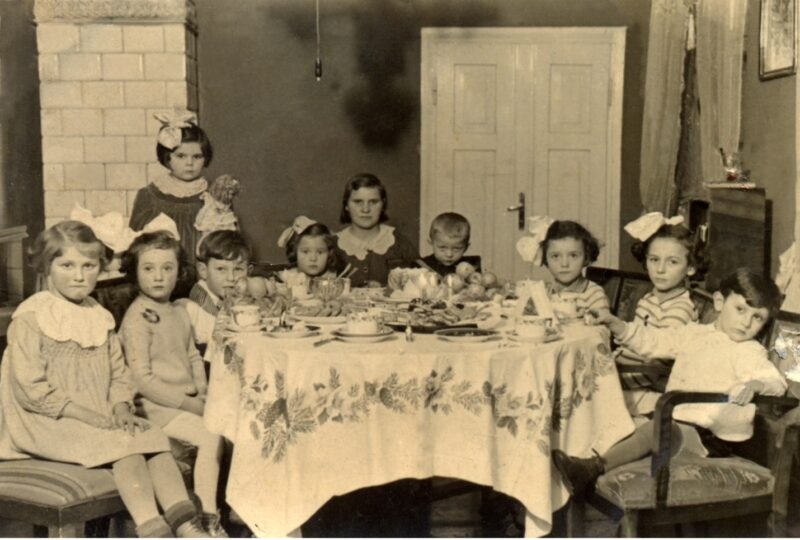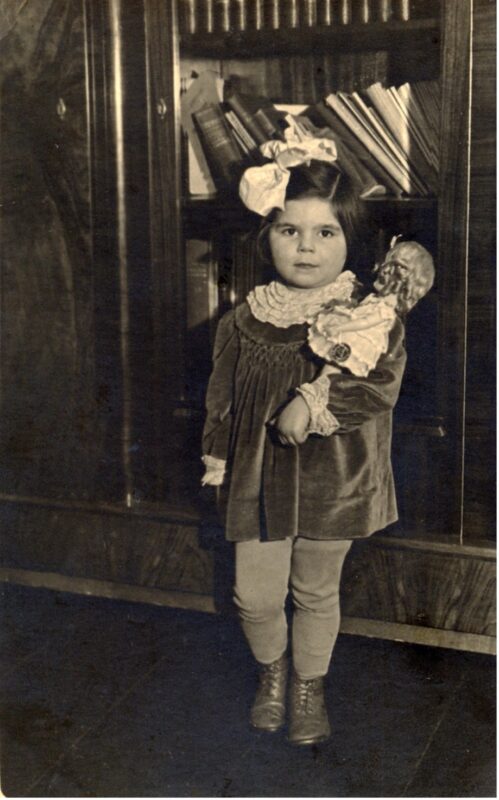VI. The Leszczynskis and the Ejzens (part 3)
2023/03/25
Text: Magdalena Krysińska-Kałużna, April 2022
The Jewish Konin, A Place Beyond the Map project as well as the blog that forms part of it, portray the small-town world of the local Jewish community that existed here until the Second World War.
And yet, today is the anniversary of the Warsaw Ghetto Uprising, and just beyond our border there is a war in which people are being brutally murdered again. This is why, in this last blog post about the Leszczyńskis and the Ejzens, we’re recounting memories of Maria Leszczyńska Ejzen, a resident of Konin who was sent to a ghetto as a child.
“I was happy for six years. That was in my family town, Konin, where two families resided: the Leszczyńskis – owners of windmills, watermills and oil mills – and the Ejzens – people with no fortune, who achieved everything through their efforts: doctors, lawyers, bailiffs, even Viennese actors. My father, Majer Juda Ejzen was a barrister. I remember the death of grandpa Ejzen before the war and his orthodox funeral, the wedding under the chuppah of my aunt Mira Leszczyńska. I remember the apartments of my relatives, family gatherings, sabbaths at grandma Rózia’s place, her magical musical potty. Happy six years!
“In 1939 my father was called into the army. Me and Mommy and the Leszczyński family moved to Poddębice, to my great-grandma’s estate and later to Warsaw. We believed that the Germans won’t get so far. I remember a dramatic pilgrimage on a horse carriage through Poland, the bombing, the siege of Warsaw, first blood, corpses.
“Father found us after the capitulation. Konin was already occupied by the Germans, we lost everything, there was nothing to go back to. In November 1940 we moved to the Warsaw Ghetto. My beautiful, Semitic father was not suitable for the Aryan side and we didn’t know anyone in Warsaw, all our relatives were sent to the ghetto.
“We moved into a large, multi-unit apartment at Nowolipki Street, right by the wall. Father started working as a laborer in a mill. He was supporting the whole family: grandma Rózia Leszczyńska, aunt Hanka Nasielska with her parents, uncle Ickowicz. We ate together and in decreasing quantities. Back then I liked the ghetto. I’d go to kindergarten, to the garden. I went to a play titled Dobry Doktor Ojboli (English: Good Doctor Ow-it-hurts), a huge experience. Mommy taught me to read and write, to no avail.
“Then, the hunger began and I fell ill with typhus. Grandma Rózia would sit by my side and tell me stories from our family life as if they were fables. I remember all of them! Then I got gangrene on my hands and legs. It got bad again. I still can see my grandma tearing a bed sheet apart, soaking it in boiling water – the only medicine available – and wraps it around my fingers…
“We had to move out from Nowolipki, because the apartment was too large and there were too many people. It was difficult to hide. My parents, Grandma Rózia and I joined the Toebbens Block to Leszno. I don’t know where the others went. I never saw a single one of them ever again. They vanished into thin air, disappeared without a trace.
“In Leszno Grandma Rózia died. She was in a storage room on the ground floor, she had a heart disease and couldn’t walk. We would block the storage room door with a wardrobe. We hid in the basement until Mommy got her number from Toebbens. One day we returned after a blockade, the wardrobe was untouched, in front of the storage room door, but the room was empty. The duvet was thrown aside. Grandma was gone. Daddy said ‘She went to Heaven.’ We all cried terribly.
“Leszno was constant alarms. A blockade – must hide, run home, hours without moving, waiting for the Germans to leave our home, awful fear about Father, if he survived. Once the Germans ran into our backyard, Mommy and I didn’t manage to go down in the shelter in time and with a large group of other people were pushed into a corner by the Germans. They fired at us one volley, but neither Mommy nor I got injured. We fell under the corpses of the others and survived.
“Yet another time, the Germans pulled us out of the shelter and I got mixed up in the group being led to Umschagplatz. I don’t know how this happened, but I ended up alone on an upper floor of a building at Umschlagplatz. I was standing ankle-deep in shit, then suddenly I hear ‘Marychna!’ It was my dearest Daddy. He carried me under his topcoat, on his back. I was holding on under his armpits. I was so small and thin that no one could see me. He bribed everyone. Sometimes at night I can hear a voice shouting ‘Marychna!’ and I run, but there’s no one there.”*
*Maria Leszczyńska Ejzen, Jestem cała z tamtego świata (English: I’m all from that other world), Oficyna Bibliofilów, 1999, pp. 4-6.
Translation: Ada Kałużna
Marychna Leszczyńska. Birthday, 1939.

Marychna Leszczyńska. Birthday, 1939. On the photo depicted are also twins Dziunia and Ewunia Bułka and Rysio Margules.


